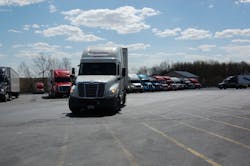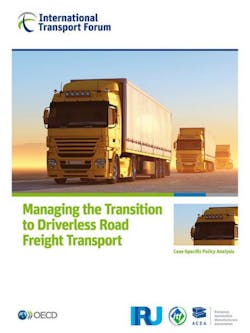Does the autonomy debate further devalue the truck driver?
Yes, yes, I know; we’re spending a lot of time talking about autonomous vehicles (AVs) right now and it’s probably driving more than a few truckers batty, safe to say.
By that I simply mean a huge disconnect remains concerning trucking’s role in our economy and even more broadly in our society. We think it’s easy to just tell a computer to go pick up freight over here and haul it 500 miles over there. Piece of cake, right?
Uh, no; not even close. And that’s before we start in on how today’s consumers – thanks to Amazon and e-commerce – now expect goods ordered online to be on their doorstep in a few days at the latest. And, oh, by the way, they’ll send it right back if they don’t like it.
And, what, you expect them to PAY for the shipping and handling of their goods? Puh-leeeze! That’s free or they’ll take my money elsewhere. Oh and don’t tell them about the shortage of drivers, or how bad weather affects transportation networks, or the rising cost of new trucks; those aren’t their problems, they’ll tell you – just where the heck is the stuff they ordered 24 hours ago? Chop, chop!
AVs, of course, are touted as a solution to such issues since they take factors such as human error and fatigue out of the equation – simply by removing humans entirely from the equation.
Yet that “solution,” if we want to call it that, furthers the already abysmal lack of respect for the truck driving profession. Everyone figures a machine can drive a truck far more cheaply and safely than a human, with usually not a clue about how truly dangerous piloting a big rig can be – some 745 heavy truck and tractor-trailer drivers suffered fatal injuries in 2015, according the Bureau of Labor Statistics, the most of any occupation – nor how many jobs are at stake, either.
Even this global report that warns of the potential job losses due to the automation of trucking, took a backhanded stereotyped swipe at truck drivers as a group.“While truck drivers are typically flexible, self-reliant and able to concentrate for long periods, their relatively low education level and potential automation in other sectors puts them at a high risk of extended periods of unemployment,” that study, entitled Managing the Transition to Driverless Road Freight Transport, bluntly stated.
That “relatively low education level” descriptive raised the ire of more than a few readers, especially for one of my regulars: Steve Myers, a former driver turned truck salesman.
“Low education? What an insult! The guy or gal [driving a truck] has to plan several days ahead for pickup and deliveries,” he rightly exclaimed to me in an email.
“They have to be aware of time zones, road restrictions, hazmat routes, and hours of service,” he stressed. “How many people know how to read a log book, much less fill one out and keep track of miles and hours and sleeper berth? They need to be a meteorologist, a mathematician, a computer operator, a mechanic, and sometimes a psychologist. The truck drivers keep the trucks moving.”
Myers added, too, that the traits of “flexibility” and “self-reliance” so casually mentioned in that report are the very keys to keeping freight flowing smoothly and thus our economy functioning efficiently.
“’Flexibility’ should read as adaptable, able to change quickly and adjust to varying circumstances quickly,” Myers told me. “Drivers literally look ahead and drive accordingly. They will see far more than what may be indicated on a radar screen. Will the radar screen know that the ball is being followed by a small child?”
And then there is self-reliance, which is a trait that will be extremely difficult – if not impossible – for a machine to truly replicate.
“Drivers are self-reliant and know how to handle the unforeseen,” Myers stressed. “How will the autonomous vehicle handle a steer tire blow out? Which driverless truck will come to the aid of a stranded or injured motorist? When will the autonomous vehicle give assistance to a law enforcement officer who needs a hand?”
These are all great points and one the experts developing AV systems need to take into account. For in many ways they are the unique and irreplaceable capabilities of all of us human beings.

